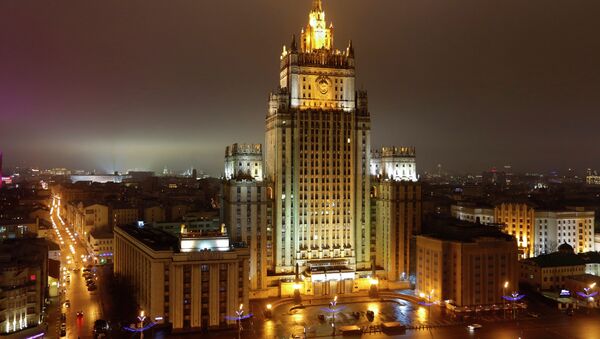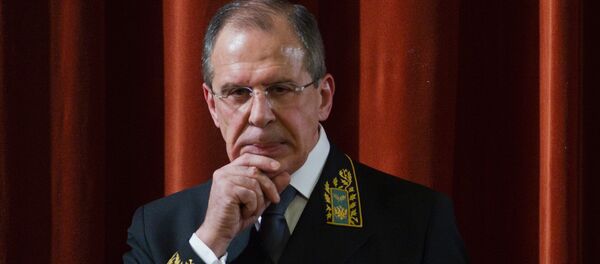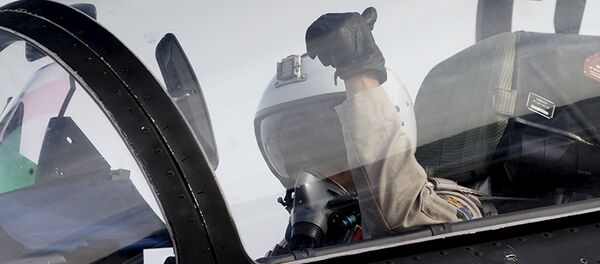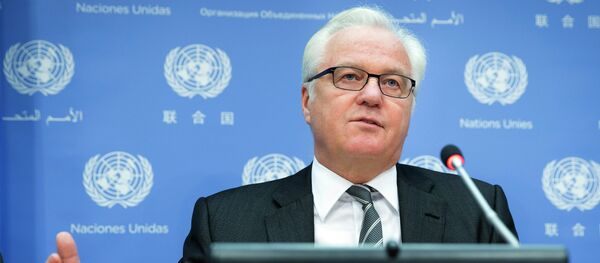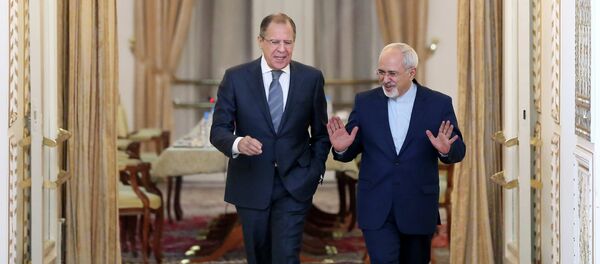Taking a step back to analyze the important successes of Russian diplomacy over the past three years, RT Russian explained that over the past three years, Russian diplomats managed to prevent a Western invasion of Syria, to find compromise over the conflict in Ukraine, and to help solve the once seemingly intractable Iranian nuclear issue. "All this," RT noted, "has allowed Moscow to return the forefront of the political big-leagues."
Syrian Crisis
"Experts," RT Russian recalled, "spoke about Syria as a new Cuban missile crisis."
"The main argument brought forward by the Americans at the time was the chemical attack which had cost the lives of hundreds of people in a suburb of Damascus. An incomplete and drawn out investigation lasted for more than a year, but could confirm only that sarin was used. The culprit has not been named."
"All the while," Western media "conducted its own 'investigation'…convincing themselves and their readers that Bashar al-Assad was a criminal who deliberately killed hundreds of Syrian civilians. The question about why the president would use chemical weapons literally right next to his own army, knowing that civilians would die, at the moment when a turning point in the conflict was taking place was not one which bothered most Western journalists very much. The sentence was handed down, and was not subject to revision."
On September 11, 2013, the United States postponed the planned attack on Syria, with Congress taking a break to discuss a timely Russian initiative for peacefully transferring the Syrian chemical weapons under international control. "Commenting on his decision in a special televised address to the nation, President Barack Obama acknowledged that the talks with Vladimir Putin on the issue had been a major influence in his decision."
For its part, Damascus "immediately opened its caches to UN inspectors, declared their readiness to join the global ban on the use of chemical weapons, and one after another, the containers with toxic substances began to leave Syria. This episode gave the first hopes for a peaceful resolution to the Syrian conflict, and showed that Bashar Assad can and should be negotiated with."
Newfound Reserves of Strength in the UN
"By 2014, the UN was even more firmly entrenched as an organ to 'find the guilty party', rather than an organization aimed at compromise and the ability to resolve the world's major crises." A place was prepared for Russia as the 'main violator of world peace."
However, "Russian diplomats, initially reacting with restraint, gradually went on the offensive. The chief representative of the Russian side in the diplomatic battles in the UN was Vitaly Churkin. The diplomat became the only one among the UN members' major powers to make speeches going against the flow of the one-sided rhetoric of the West. The naiveté of Russia's Western partners as far as the events in Ukraine were concerned bordered on the absurd."
The Minsk Agreements
In September 2015, Russia initiated the signing of the Minsk Protocol on peace in southeastern Ukraine. "As in the case of the Syrian disarmament, Moscow was responsible for proposing the format which, in spite of the perceived conflict of interest, was deemed acceptable by both Kiev and the Donbass republics" in the country's southeast, which had broken off from Ukraine following the Maidan coup d'état.
#Zakharova: It is crucial to eliminate all remaining violations of the ceasefire regime and fully implement the Minsk Agreements
— MFA Russia (@mfa_russia) 10 февраля 2016
"After lengthy negotiations and a series of international meetings, on February 12, 2015, a second version of the agreements was signed, aimed at resolving the crisis in southeastern Ukraine." Attended by the so-called 'Normandy Format' group of countries (Ukraine, Russia, Germany and France), as well as representatives of the OSCE and the Donbass republics, "the final revision of the Minsk agreements involves a complete ceasefire, the withdrawal of heavy weapons, the beginning of talks on amnesty for a number of persons…the holding of elections, and other important provisions. Through 2015, both sides repeatedly accused one another of violating the agreements, but ultimately, in general, the ceasefire has held to this day."
Iran's Nuclear Program
In the summer of 2015, with Russia's active participation, world powers came together to resolve what had previously been considered the "intractable issue" of Iran. "Tehran's alleged nuclear program was considered to be one of the most serious" regional and global problems escalating tensions in international relations.
"Sergei Lavrov actively participated in the negotiation process between Iran and the group of six international mediators (the USA, Russia, China, Britain, France and Germany). As a result of a real diplomatic marathon in Geneva, a balance of interests was found, providing for Iran's right to the peaceful development of nuclear energy, including uranium enrichment, at the same time retaining the nuclear nonproliferation regime."
2015: Putin's General Assembly Appearance
"A series of high-profile diplomatic successes strengthened Vladimir Putin's position as the major political figure of his time," RT unabashedly writes. "His speech at the UN General Assembly in 2015 was awaited by all of the world's leaders."
"The Russian leader almost managed to stay within the allotted 15 minutes of time. During this time he managed to touch on all the main points on the international agenda. Later, his speech was deservedly named to have been the most outstanding for the entire session. Among the other speeches was Barack Obama, who in 40 minutes could not say anything of substance, as well as Israeli Prime Minister Benjamin Netanyahu, who amazed participants with his dramatic [43 second] theatrical pause."
"Two days later, the Russian and American leaders met in person. Immediately after this conversation, on September 30, the Russian Senate gave the president authorization to use force in Syria. Syrian President Bashar Assad had asked for the assistance of the Russian Aerospace Defense Forces to assist with resolving the situation in Syria. Putin accepted the request, and on the same day, the Defense Ministry reported the first successful bombing against terrorist positions in the country."
Russia's New Role in the World
"The Antalya G-20 Summit of November 2015 took place against the background of terrorist attacks in Paris, in the Sinai [against the Russian passenger plane], and in light of Russia's growing role in the fight against international terrorism. There, Russia and its leader were met with a completely different attitude from the previous meeting in Brisbane, Australia in 2014. During his speech, Putin first hinted at the fact that Turkey was secretly assisting Daesh and trading in oil with the terrorist group."
Following the Turkish shootdown of a Russian Su-24 jet in Syria, "Moscow's pointedly restrained reaction only served to strengthen its role as a country which seeks to solve even the most acute geopolitical conflicts through negotiations. Without waiting for an official apology from Ankara, Moscow imposed a number of restrictive measures against Turkey."
"Russia's successive and reasoned action on the international scene toward the end of 2015 finally dispelled the myth of Russia's 'isolation', so actively exaggerated in the world media" in the aftermath of the crisis in Ukraine. This was something admitted by US Secretary of State John Kerry during his visit to Moscow in December.
Ultimately, RT Russian noted, "it is impossible to predict what role awaits Russia in the future, but the fact that Moscow has regained its status as a world power to be reckoned with isn't a secret to anybody."
